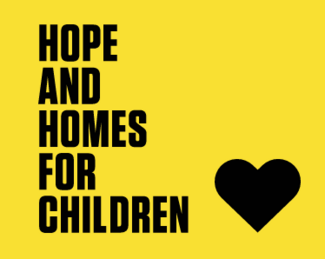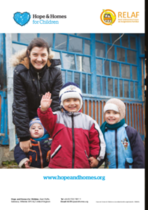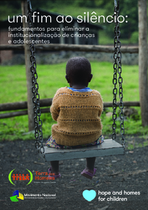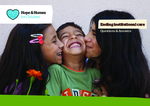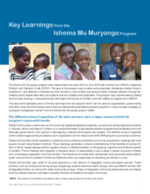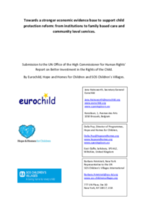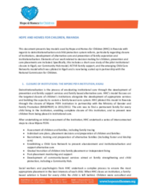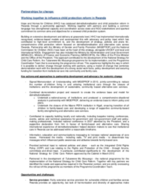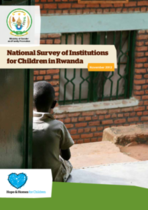Home and Homes for Children is a UK-based charity that works to close orphanages and get the children inside them back to family.
Around the world, more than 5.4 million children are confined in orphanages, even though 80% of them have family they could be living with if they had the right support.
Hope and Homes for Children works in more than 10 countries across Europe, Africa and Asia to give children and families the support they need and change the systems that are putting children in institutions.
Their teams are helping families to stay together or be reunited, and creating new families through fostering and adoption, so that every child can grow up in a safe, loving environment where they can thrive.
They are also working with local authorities, governments and international bodies like the UN and EU to improve their policies and end the institutionalisation of children forever.
To contact Hope and Homes for Children, please fill out the contact form available here.
Where they operate
Headquarters Location
East Clyffe, Salisbury
Wiltshire
SP3 4LZ
United Kingdom
Organization Type
Main Areas of Work
What They Do
Keeping Families Together – Where war, poverty, discrimination or broken systems put pressure on parents to give up their children, Hope and Homes for Children fight to keep families together. Working with care and compassion, listening and understanding, they let families know there’s someone who cares about their situation, and provide them with the hope and support they need to keep their child within their family home.
Reuniting Families – Millions of parents are longing for the children they have been separated from. And children who could be back at home are lost in the bureaucracy of an orphanage. Through local teams including family tracing experts and specialist social workers, Hope and Homes for Children and their partners reconnect children with their loved ones. And once children are reunited, they stay by their side to help them adapt to their new life together.
Creating New Families – Hope and Homes for Children supports children whose birth families can’t look after them or keep them safe, or those who have no family at all. They work with individuals and authorities to find, train and support foster or adoptive parents: adults who they know from experience will love, protect and give security to a child. With their social workers, psychologists and educationalists by their side, new parents can give children the love they need to grow up and thrive in life.
Closing orphanages - Closing an orphanage for good is an extremely complex process that can take many years to complete. Hope and Homes for Children teams work with a range of local and national authorities and organisations - including local councils, community leaders, medical professionals and child protection authorities - in order to achieve that life-changing moment when an orphanage is closed for good and the children once confined within it are instead Back to Family.
Advocating for change - Many governments and regional authorities still use the institutionalisation of children as a childcare solution. By making them aware of the immense harm that placing children in institutions does, and showing the positive impacts that family-based care brings, Hope and Home for Children’s advocacy team is working to change attitudes and reform child care practices on both a national and international level.
HHC Advisory Services - drawing on their global operational delivery and partnering experience, Hope and Homes for Children provides a compelling package of technical support services to governments, UN agencies, local and international NGOs in other countries around the world. They work to bring about the transition of children’s care and protection systems to family-care. They support local initiatives, under local leadership and capability. Their focus is on locally owned, sustainable solutions and impact at scale. They are passionate about protecting the rights of all children, to see them brought up in safe, loving, nurturing families.
Organization Resources
Décadas de investigaciones comprueban que el crecimiento de un niño en una institución posee un impacto nocivo en cuanto a lo psicológico, lo emocional y lo físico, incluyendo trastornos de vinculación, retrasos cognitivos y en el desarrollo, y una falta de capacidades sociales y para la vida que luego concluyen en múltiples desventajas durante la adultez.
Décadas de pesquisas comprovam que o crescimento em instituições de acolhida gera consequências psicológicas, emocionais e físicas, incluindo transtornos de apego, atrasos cognitivos e no desenvolvimento, e uma falta de habilidades sociais e de competências para a vida, trazendo diversas desvantagens na idade adulta.
This policy paper from Hope and Homes for Children calls on all the stakeholders that play a role in developing, running, supporting or influencing national care systems to join forces in a collaborative action to eradicate institutional care once and for all.
This publication includes common questions and answers on the implications of institutional care and why it should be ended.
This presentation was delivered at the Africa-Wide Children Without Appropriate Care Program Learning Event: “Shaping our care reform work across Africa,” held in Ethiopia on 20-23 April 2015. It provides an overview of the Tracking Progress Initiative, which includes the development of a tool to measure country progress in implementing the Guidelines for the Alternative Care of Children.
This document highlights some of the key learnings from the Ishema Mu Muryango program, a program designed to safely and sustainably reintegrate children living in institutions in two districts of Rwanda into their families or communities and prevent further institutionalization.
Eurochild contributed to the UN Office of the High Commissioner for Human Rights' report “Towards a better investment in the rights of the child” with a joint submission with Hope & Homes for Children and SOS Children’s Villages International.
This document presents key models used by Hope and Homes for Children (HHC) in Rwanda with regards to deinstitutionalisation and child protection system reform, particularly regarding closure of institutions, development of alternative care and prevention of family separation and institutionalisation.
A short brief by Hope and Homes for Children (HHC) in Rwanda explaining strategies used in the process of taking its deinstitutionalisation pilot project and research up to policy-level advocacy.
Hope and Homes for Children, in partnership with the Ministry of Gender and Family Promotion (MIGEPROF), has conducted a national survey of all institutions for children in Rwanda to obtain an accurate picture of the current institutional system and the children living within it which can be used to inform decision-making regarding the implementation of the reform strategy and provide a baseline against which progress can be measured in the future.

